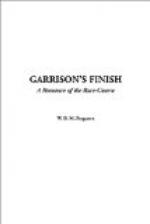He was like a raw recruit who has been lying on the firing-line, suffering the agonies of apprehension, of imagination; experiencing the proximity of death in cold blood, without the heat of action to render him oblivious.
Garrison had been on the firing-line for so long that his nerve was frayed to ribbons. Now the blow had fallen at last. The exposure had come, and a fierce frenzy possessed him to complete the work begun. He craved physical combat. And when he thought of Sue he felt like a murderer fleeing from the scene of his crime; striving, with distance, to blot out the memory of his victim. That was all he thought of. That, and to get away—to flee from himself. Afterward, analysis of actions would come. At present, only action; only action.
It was five miles to the Cottonton depot, reached by a road that branched off from the Logan Pike about half a mile above the spot where Waterbury had been thrown. He remembered that there was a through train at ten-fifteen. He would have time if he rode hard. With head bowed, shoulders hunched, he bent over the gelding. He had no recollection of that ride.
But the long, weary journey North was one he had full recollection of. He was forced to remain partially inactive, though he paced from smoking to observation-car time and time again. He could not remain still. The first great fury of the storm had passed. It had swept him up, weak and nerveless, on the beach of retrospect; among the wreck of past hopes; the flotsam and jetsam of what might have been.
He had time for self-analysis, for remorse, for the fierce probings of conscience. One minute he regretted that he had run away without confessing to the major; the next, remembering Sue’s advice, he was glad. He tried to shut out the girl’s picture from his heart. Impossible. She was the picture; all else was but frame. He knew that he had lost her irrevocably. What must she think of him? How she must utterly despise him!
On the second day doubt came to Garrison, and with it a ray of hope. For the first time the possibility suggested itself that Dan Crimmins, from the deep well of his lively imagination, might have concocted Mrs. Garrison and offspring. Crimmins had said he had always hated him. And he had acted like a villain. He looked like one; like a felon, but newly jail-freed. Might he not have invented the statement through sheer ill will? Realizing that Garrison’s memory was a blank, might he not have sought to rivet the blackmailing fetters upon him by this new bolt?
Thus Garrison reasoned, and outlined two schemes. First, he would find his wife if wife there were. He could not love her, for love must have a beginning, and it feeds on the past. He had neither. But he would be loyal to her; loyal as Crimmins said she had been loyal to him. Then he would face whatever charges were against him, and seek restoration from the jockey club, though it took his lifetime. And he would seek some way of wiping out, or at least diminishing, the stain he had left behind him in Virginia.




